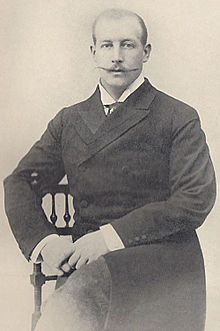Prince George of Greece
| Prince George | |
|---|---|

Prince George in 1902
|
|
| Born |
24 June 1869 Corfu, Greece |
| Died | 25 November 1957 (aged 88) Saint-Cloud, Île-de-France, France |
| Burial | Royal Cemetery, Tatoi Palace, Greece |
| Spouse | Princess Marie Bonaparte |
| Issue |
Prince Peter Princess Eugénie |
| House | Schleswig-Holstein-Sonderburg-Glücksburg |
| Father | George I of Greece |
| Mother | Olga Constantinovna of Russia |
|
Styles of Prince George of Greece and Denmark |
|
|---|---|
 |
|
| Reference style | His Royal Highness |
| Spoken style | Your Royal Highness |
| Alternative style | Sir |
Prince George of Greece and Denmark (Greek: Πρίγκιπας Γεώργιος; 24 June 1869 – 25 November 1957) was the second son of George I of Greece and Olga Konstantinovna of Russia, and is remembered chiefly for having once saved the life of the future Emperor of Russia, Nicholas II in 1891 during their visit to Japan together. He served as high commissioner of the Cretan State during its transition towards independence from Ottoman rule and union with Greece.
From 1883, George lived at Bernstorff Palace near Copenhagen with Prince Valdemar of Denmark, his father's younger brother. The queen had taken the boy to Denmark to enlist him in the Danish royal navy, and consigned him to the care of Valdemar, who was an admiral in the Danish fleet. Feeling abandoned by his father on this occasion, George would later describe to his fiancée the profound attachment he developed for his uncle from that day forward.
In 1891, George accompanied his cousin the Tsesarevich Nicholas on his voyage to Asia, and saved him from an assassination attempt in Japan, in what became known as the Otsu Incident.
George, along with his brothers Constantine and Nicolas, were involved with the organization of the 1896 Summer Olympics in Athens. George served as president of the Sub-Committee for Nautical Sports.
...
Wikipedia
